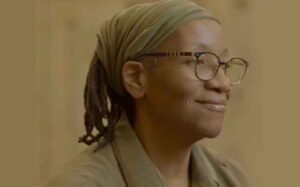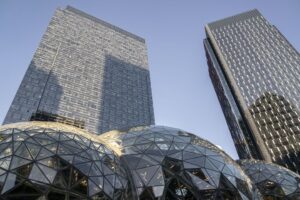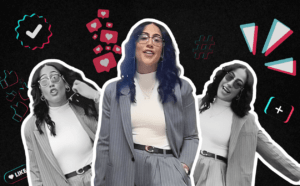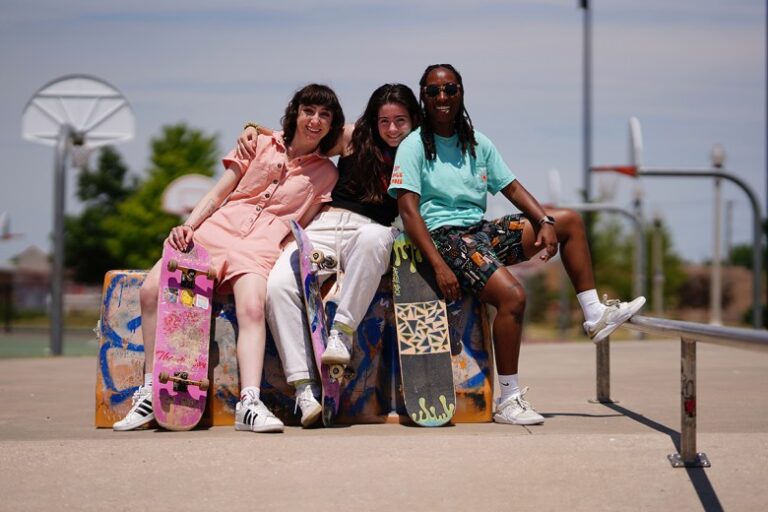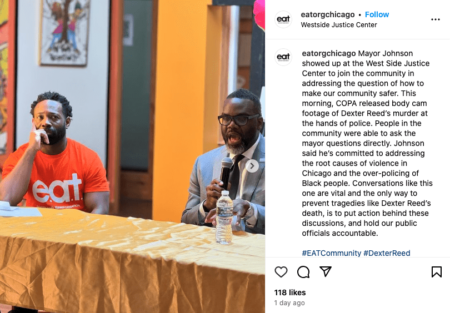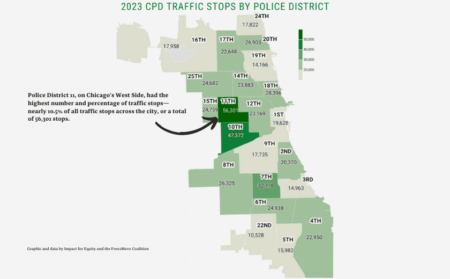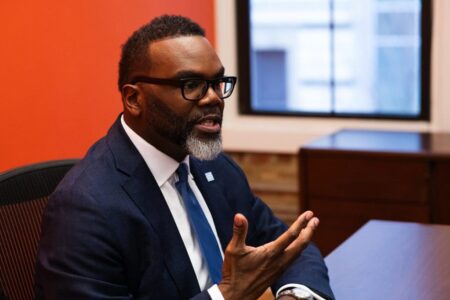“When we go to a skate park, we take up space, and then all of a sudden you don’t see a bunch of guys trying to tell you to move out the way, ’cause we’re the majority now,” says Lid Madrid. “And we’re taking up space, and just changing the way that skate parks traditionally look. Because when our community comes in, you have BIPOC skaters, you have trans skaters, you have gender-nonconforming skaters. It’s, like, unreal.”
Madrid is one of the cofounders of OnWord Skate Collective, a local skate crew that welcomes skaters of all ages and all abilities, prioritizing women, trans, nonbinary, and gender-nonconforming people, and anyone else who identifies as LGBTQ+.
When OnWord hosts a meetup, they start with introductions, pronouns, and positive affirmations. Skaters go around the circle and say things like, “I am enough.” “I’m a badass.” “I will bring authenticity and love into everything that I do.” It creates a sense of safety and community for those not typically welcome at skate parks.
OnWord was founded in January 2021. In typical pandemic fashion, it began over Zoom, with big ideas spoken through screens and a thrilling sense of potential. Madrid and cofounders Bridget Johnson, T Smith, Cath Hodge, and Deb Hwang received a grant from the School of the Art Institute of Chicago (SAIC) to build a DIY skate park. Madrid, then an architecture student, took the lead on designing individual elements like custom beginner-friendly ramps and rails, and then fabricated the parts in SAIC’s wood shop. OnWord participants swapped power-tool tips as well as skate tricks, and they constructed their own skate park.
They called the project OnSite, and it was the perfect outlet to experiment with skateboarding, inclusive design, and community-building. The first day they built it, and the second day they skated it. Filmmaker Johnson documented the experience on camera, saving Zoom recordings and conducting in-person interviews along the way for a short film.
OnSite was a success, and so was the short that came out of it. The original Breaking the Barrier is full of interviews and action shots of OnWord skaters building the park and skating together; there are young skaters in elbow pads and knee pads, pronoun stickers and top-surgery scars, and an overwhelming amount of queer joy. After a sold-out showing at the Martin, an artist-first event space in West Town, the movie won best documentary short at the Music Box Theatre as part of Premiere, DePaul’s film festival.
But the OnWord crew were far from finished. OnSite and the short film seamlessly paved the way for more changes in the skating world—and for a much bigger film.
“This [SAIC] grant really just allowed us to turn one singular project and one singular event into an entire collective,” Madrid says. They skate together, sure, but in Madrid’s own words, OnWord is first and foremost a community. “It’s a space for skaters—the community of skaters that we have—to share resources, to learn from each other, and also to just hang out and have a good time, and feel included in a skate park.”
It’s often difficult for nontraditional skaters—anyone who isn’t a white, cisgender, straight man—to find role models and feel welcome in skateboarding. Like some of the OnWord founders, I picked up skating during the pandemic. I live in Uptown near Wilson Skate Park, but I’ve only ventured over a handful of times, and only at non-peak hours. As a queer female and a beginner, I find myself sticking to the adjacent parking lot instead of braving the park itself, feeling a strong sense of unworthiness. And I’ve been lucky—most of the Wilson skaters seem to ignore me, but some women experience direct harassment or inappropriate behavior surrounded by so much toxic masculinity.
That harassment and the accompanying senses of isolation and unworthiness are exactly what the founders of OnWord want to eliminate.
The OnWord crew host skate meetups and teach lessons; they utilize Madrid’s skills in architecture to teach skate park building and construction; they’re big on skill-swaps, where roller skaters and skateboarders switch wheels and help each other learn; and they also organize events like clothing drives, social hangouts, and town hall conversations.
This work and the relationship-building with OnWord skaters helped Johnson realize that there was potential to turn Breaking the Barrier into a full-length film. It will be the first feature film to come out of her company Dare to Dream Productions, which seeks to tell authentic and positive queer stories with inclusive practices. Like the short film, the documentary will explore identity, equality, and community through interviews with OnWord founders and participants.
Johnson speaks with such admiration for the OnWord members turned interviewees. “I love just seeing the joy in people’s lives that OnWord has brought to them,” she says. “How they look forward to our meetups on the weekends, and how we’ve kind of become like a family that’s not just about skateboarding.”
Breaking the Barrier will also highlight accessibility, with a broad focus on the south and west sides.
“I think something that we like to keep in mind is that the type of spaces that we wanna create don’t have all that much impact if the people we’re tryna reach can’t get to it,” says Smith, one of the founders. “So it’s been super important for us to be mobile, especially in a place like Chicago where it’s super segregated, where a lot of people don’t even necessarily feel comfortable going to certain areas just because it’s unfamiliar to them, or they don’t have a car to get there, or they might have to leave the event at night.”
Chicago has plenty of LGBTQ+ community resources, but they’re disproportionately on the north side. “Then, everybody else is kinda just left out,” says Smith. “Even if you can get there, in terms of transportation, I think having something centered on the north side sends a certain type of message to various communities.”
And they’re correct—the city doesn’t have any skate parks south of 31st Street, and most of the well-known skate shops like Uprise or Wilson Yards, for example, are on the north side, which means that huge portions of Chicago don’t have access to skating resources and spaces. Burnham Skate Park on 31st is one of the only parks not located up north. “Burnham was not even built or designed by skaters,” Madrid says. “The people who made that were, like, a sidewalk company. So there are ginormous holes in the skate park where your wheels can get caught. And that’s so unfair, you know what I mean?”
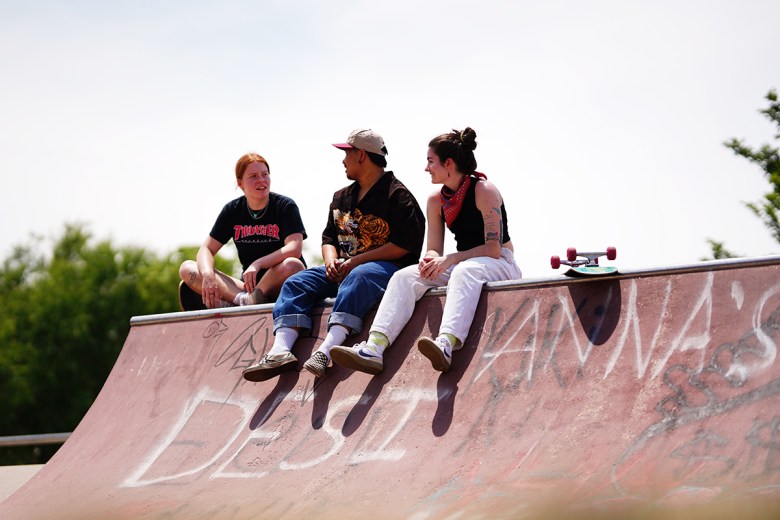
OnWord wants to get funding for a truck, large enough that they can transport their mobile skate park anywhere. (For now, it lives in Madrid’s garage.) They also want to transport their film. After the festival circuit, OnWord wants to bring Breaking the Barrier to Chicago public schools and local LGBTQ+ groups. They plan to screen the film and offer Q&A sessions, host interactive skate workshops, and create safe, open spaces for young queer people to talk about identity and belonging.
It will also be a full-circle moment for Johnson as a filmmaker. “Creating my first feature film has always been my dream since I was 12,” says Johnson. “I’ve met some beautiful souls during this journey so far, and I’m looking forward to meeting more, especially getting the opportunity to showcase the film at schools. I can’t wait to go back to my old elementary school and see my old teachers who encouraged me to follow my dreams.”
On paper, Breaking the Barrier’s target audience generally includes teenagers to 30-somethings, the skateboarding community, and Chicagoans, given its rootedness in the city’s people and physical spaces. However, that’s another barrier the filmmakers want to break.
“We’re hoping to connect to a bigger audience,” Johnson notes. “Because it’s not just about skateboarding, but finding a safe space and what community means to a variety of different people in Chicago.”
“I want everybody to see it,” Smith adds. “I want everybody to hear it.”
They continue, “When I talk about OnWord and what we do and why we exist, I always say: If you were to have a conversation with someone and ask them to picture a skater, they’re probably not gonna picture most of the people that show up to our events. So we wanna challenge that, we wanna go beyond that norm, we wanna break that stereotype of having a certain image when you think of a skater. Literally anybody can skate! And anybody does skate, right?”
And that’s the deal—anybody is welcome at OnWord. Breaking the Barrier will be a reflection of that inclusivity, and an example of the power of films made by queer people, of queer people, for queer people.
When Johnson was first discovering her sexuality, she leaned on her love of film. Like many people, however, she felt overwhelmed with queer media depicting tragic endings, breakups, and often death. Johnson knew that Breaking the Barrier should be feel-good and inspiring instead.
“Maybe skateboarding is not for everyone, but there’s always something that you’ve always wanted to do, and hopefully this film empowers people to wanna actually pursue that,” she says. “We want to be the representation and role models we never had growing up.”
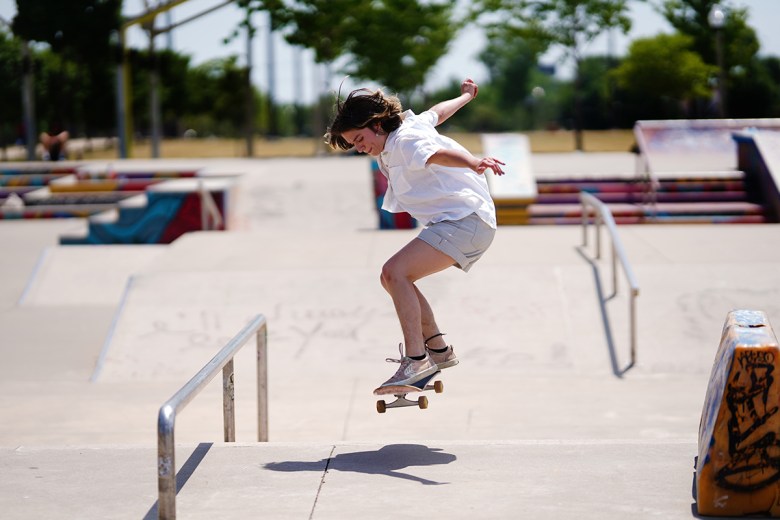
While audiences will eventually see the accomplishments of OnWord in front of the camera, the filmmakers also want to ensure that they’re approaching the work behind the scenes with similar intention. The film industry is known for grueling hours, low pay, and even hazardous working conditions, but OnWord’s collaborative DIY approach and commitment to working with diverse local filmmakers will combat this.
“It’s very toxic, how some film crews are run, and how you’re working 14-16 hours without very many breaks,” Johnson says. “And so what we’re trying to do is work less hours and also have more positivity on set.”
Through a mix of school connections and social media, OnWord has created a film crew made up of women and LGBTQ+ Chicagoans, most of whom are also skaters and share a passion for OnWord’s mission in the skate community.
OnWord’s last barrier? The funding. Lucia Agajanian is currently signed on as a producer for Breaking the Barrier. The team has an Indiegogo campaign set up to raise money for production, and they’ve been applying for grants and pitching the idea to get other producers on board. They’re hoping to carry the momentum of the short film and make some headway on funding this summer, all while keeping up with their usual programming.
OnWord will host OnSite 2.0 on August 6, 7, and 8, and have a chance not only to build a new DIY skate park, but also to conduct more interviews and really flesh out the documentary. The finished Breaking the Barrier will go all the way back to those early Zoom calls between the cofounders, ending with this product of their tremendous efforts.
“The film will really start with the origins of OnWord, and then [go] to wherever we end up,” Johnson says. “Like I think that’s the beauty of it—we’re kinda just following our skaters and seeing where life takes them.”
Did you know? The Reader is nonprofit. The Reader is member supported. You can help keep the Reader free for everyone—and get exclusive rewards—when you become a member. The Reader Revolution membership program is a sustainable way for you to support local, independent media.
